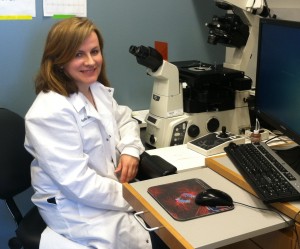Investigator Spotlight: January 2016

Agata Jurczyk, Ph.D.
Dr. Jurczyk is an instructor at the University of Massachusetts. She works with nPOD Investigator, Dr. Dale Greiner.
-
Tell us about your education and background – where are you from, where did you go to school?
I grew up on a small farm in Poland and immigrated to Massachusetts with my family when I was a senior in high school. Although I knew very little English before coming to the US, I graduated from high school two years later and finished my undergraduate education with a major in biology, chemistry and mathematics at Elms College in Chicopee, MA, Magna Cum Laude. I have been interested in biology and science since I was a child, so I continued my education by obtaining a Master’s degree in plant molecular biology from Smith College in western Massachusetts. I received my Ph.D. in 2004 from the University of Massachusetts Medical School, where I studied the function of specific proteins in the centrosome, an organelle within the cell that helps regulate how cells proliferate.
- Where do you currently work and what is your position? What does a “day in the life” look like for you?
I currently work at the University of Massachusetts Medical School in the Diabetes Center of Excellence, where I am junior faculty at the rank of instructor. At work I am involved in designing and conducting experiments, analyzing data, writing manuscripts and seeking extramural funding to support my research program. At home I enjoy spending time with my two children. In my free time I serve as a Polish/English medical interpreter at local hospitals to help Polish-speaking patients better understand their treatment. - Why diabetes? How did you get involved in diabetes and/or what made you want to work in diabetes research?
I started work in the diabetes field during my postdoctoral research training at the University of Massachusetts under the supervision of Dr. Aldo Rossini and Dr. Dale Greiner. Over the years, Dr. Rossini and Dr. Greiner have encouraged and empowered numerous young people from different fields to bring new insights and novel ideas to the study of diabetes. When I joined the laboratory, little was known about the function of the centrosome in pancreatic beta cells. I began to investigate centrosome proteins in beta cells and found an unexpected, but important, role for centrosome proteins in regulating insulin secretion—and I’ve been fascinated with diabetes research ever since. - Tell us about your research.
My research is focused on the mechanisms of insulin secretion in pancreatic beta cells. I am a cell biologist with expertise in microscopy and image analysis, molecular biology and cellular biology. Recently, I have uncovered an unexpected role for the centrosomal protein pericentrin in maintaining normal insulin storage and secretion. This research led me to discover a link between centrosome proteins and diabetes. There is also a higher prevalence of diabetes among people with centrosome/cilia defects and neurological disorders. Patients with mental illnesses such as schizophrenia or bipolar disorder are significantly more likely to develop type 2 diabetes compared to patients without those disorders; however, a molecular link between them is unknown. We have currently identified Disrupted in Schizophrenia 1 (DISC1) as one of the possible genetic links between mental disorders and diabetes. DISC1 was known to act as a multifunctional scaffold for neurodevelopment because of its ability to regulate the proliferation and migration of neuronal progenitors, as well as for adult cognitive functioning. We identified DISC1 as a major player that controls pancreatic beta cell proliferation and insulin secretion. This work has been recently published in the FASEB Journal. Although impaired glucose homeostasis in psychiatric patients was thought secondary to CNS dysregulation, we presented an alternative perspective in which DISC1-disruption in pancreatic beta cells directly impairs beta cell function. -
What are your thoughts on the progress being made in T1D research as a whole?
I think there has been a lot of progress in treatment options and glucose monitoring for patients with T1D, but we still do not know the basic question of “what causes it?” Basic research is still desperately needed so we can one day find a cure.
- Why is diabetes research so important?
More and more people worldwide are suffering from diabetes—most of us either have diabetes or have a family member affected by it. It is very important to continue our research in order to find a cure and alleviate the financial and quality-of-life hardships that diabetes creates. - Do you have anything extra you would like to share? Is there anyone to thank or acknowledge?
There is a need for increased collaborative efforts to eradicate diabetes. We need to invest in young scientists with new and fresh ideas that are willing to dedicate their career to study diabetes. Federal funding for young investigators in basic research is getting harder to acquire, so private funding is critical to invest in novel ideas to help young scientists in their quest for the cure. - When you’re not working, what do you like to do for fun?
When I am not working I like to spend time with my family, and enjoy downhill skiing, running and Bikram Yoga.
